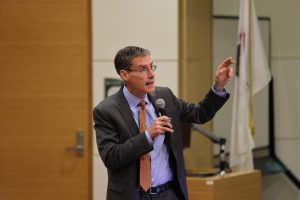A Critical Conversation: Systemic Injustice in America
June 21, 2020
College of DuPage students from all backgrounds have united together for a larger purpose in sending forth the message that enough is enough. Many student organizations have contributed in the pursuit of racial equality across the nation, but especially here, throughout COD’s campuses. A “Critical Conversation” was hosted via Zoom on June 10th by the Black Student Alliance and Student Leadership Council to focus attention on systemic injustice in America. The forum focused on activism and inclusivity for the Black community across America that has been affected by both recent and historical racism throughout the country.
David Swope, manager of the Center for Student Diversity & Inclusion, explained the importance of having a racially-based conversation and event at COD in moving efforts to fight racial injustice, now, more than ever.
Both meaningful and constructive dialogue was a main goal of the forum, set under an anti-racism initiative made by the college. Swope explained that through dialogue, mutual respect can be gained and responses become based on what is learned through listening. These efforts create an environment of tolerance and understanding that people may not see things in the same way, while being open to diverse viewpoints. By intaking the information shared, a foundation is formed towards racial equality, “we can use that information going forth to build a stronger base for the work that we do at College of DuPage for its Black community and its Black students,” Swope said.
The student leaders each spoke on the issue while also allowing a platform for further thoughts and concerns of COD students and faculty.
Black Student Alliance President, Manuel Nartey, began the discussion, voicing the extent of racial inequality and injustice in America. Nartey traced down the historical lineage of the struggles the Black community endured, on the basis of race, following the emancipation of legal slavery. He listed the names of Emmett Till, Rodney King, Trayvon Martin, Michael Brown, Tamir Rice, Eric Garner, Alton Sterling, Philando Castile, Sandra Bland, Freddie Gray, Ahmaud Arbery, Breonna Taylor, and George Floyd—to name only a small fraction of the Black community that has suffered death from police brutality. The infamous occurrences don’t account for those instances that happen off-camera, on a frequent basis.
Nartey also shared his own struggle as a young Black man in America, fighting his own experiences of racial discrimination, giving personal testament to conversations with his parents where he is warned to be cautious of his actions, at all times of the day, every day.
He shared a common instance where he has to make sure his resumes are on point, for every job, hoping that it can compensate for the color of his skin. Nartey explained racism as a constant cycle that needs to be broken.
“It is not just police brutality that is the problem here. It runs deeper than that,” Nartey said. “There has always been racism; there has always been discrimination. It goes deeper into what this skin color triggers. Police officers justify brutal force by saying their lives are in danger, saying they fear for their life. That means that this skin color triggers a sense of danger, saying that this skin color means you’re not safe.”
“It is a sense of seeing each other as human beings, seeing each other as our lives are worth living,” he continued. “It is a sense of making sure we acknowledge that privilege does exist.”
Samiha Syed, student trustee of Student Leadership Council, said in coming days, both the Student Leadership Council and the Black Student Alliance will move towards strengthening the 8:46 movement— which represents the long, brutal death of George Floyd this past month. According to Syed, this will be accomplished through various actions, including student-led initiatives, activism and advocacy. “Not just a moment, a movement,” Syed said. This is rooted in a deep effort to emphasize the underlying message, at large. The moment of this forum, led by students, is leading to a more purposeful, powerful movement.
Individual students and groups will continue in their pursuit to achieve a more equal, accepting environment at the College of DuPage, on the basis of race. As Manuel Nartey said, “we need to broaden our expansion of what civil rights actually means. We need to expand our vision. We need to make sure that we are seeing people for who they are, not as a threat or a suspect first and then a citizen second.” The college will continue to move forward by setting campus-wide initiatives, furthering the 8:46 movement through future events and more critical conversations in the coming academic year.




















